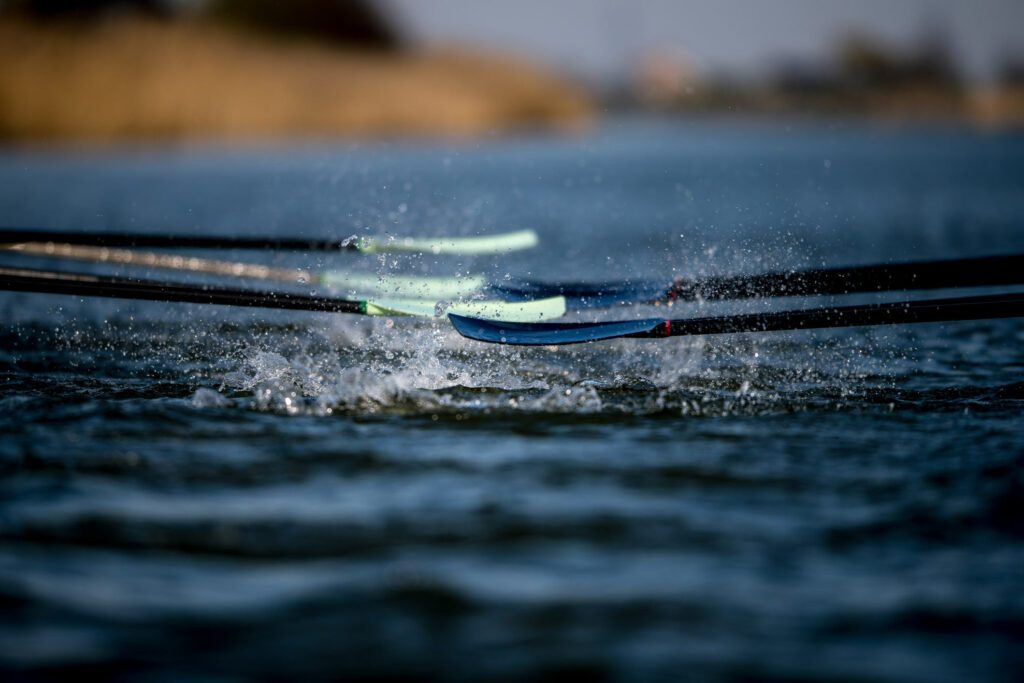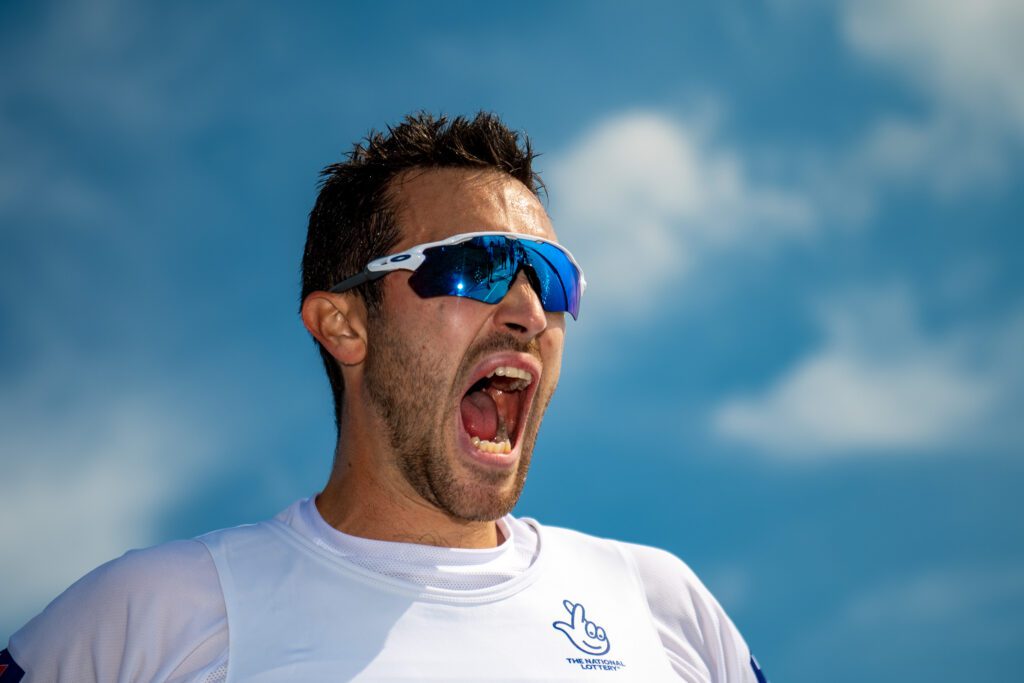The Italian anthem rang round the Labe Arena five times on Friday, as their lightweights captured five non-Olympic titles out of six and their para-team added a silver. It was a day of frenetic competition even in straight finals, with some very close decisions both in the medal events and also in the day’s semifinals as the last finalists were decided for this year’s championships.
Most of the winners were decided long before the line, but that didn’t stop photofinish images being needed to decide minor places. Less than a sixth of a second separated silver from bronze in the lightweight men’s pair and bronze from fourth in the PR2 men’s singles and one of the W2x semis. But the closest result of the day was Brazil clinging on for dear life to beat Ukraine to silver in the PR3 mixed doubles.
This was a classic example of the many great contests now appearing in para-rowing, and in a category which will appear at the Paris 2024 Paralympics: it’s only in the “non” set of finals here because this programme was decided long before the Paralympic inclusion was confirmed. France’s Elur Alberdi and Laurent Cadot are hell-bent on bringing France a home gold in the event for its first appearance at the Games, and did not give anyone else a look-in during Friday’s final, but behind them slow starters Brazil veered dramatically through the buoys in the French lane at the start and lost lots of ground. They then laboriously clambered back through Israel and Ukraine, levelling the latter by 1200m gone and then battling it out for silver and managing to see off some very good pushes from Ukraine for a 0.02 second win after trading the lead several times in the run to the line.
Cadot is extremely impressive: a former openweight European medallist oarsman who acquired a persistent infection during a disc hernia repair surgery in 2012, when preparing to row at his third Olympics. He managed bronze in the French M2+ in 2013 after recovering from temporary paralysis and learning to walk again, but continued to suffer chronic back pain and deteriorating function in his legs. In April 2022 he was told he will never fully recover but, worse, in a few years he may be unable to walk. Encouraged by his father, the interministerial delegate to the 2024 Games, he went for para-rowing classification and is now targeting the podium in Paris, the category depending on his condition’s progress but for the moment he is PR3.
Elsewhere in the para-rowing the exhibition race winners in the PR2 M1x, PR3 M2- and PR3 W2- all won their gold medals, Corne de Koning holding Italy’s bearded wonder Gian Filippo Mirabile at arms length in the PR2 singles and the unbeaten British coxed four splitting into two world-class pairs to kick off their nation’s medal count. “If I’m there getting my gold medal it’s enough motivation,” said de Koning, whose name means ‘the King’ in Dutch and who races tomorrow with mixed doubles partner Chantal Haenen. “If I am at my home club I train with able-bodied rowers, but they are less fit than I am,” he said with a justified grin. In the PR3 pairs European coxed fours champions Ed Fuller and Ollie Stanhope won by half a minute, only 1.6 seconds outside the world best time, then stayed to congratulate Mix4+ partners Francesca Allen and Giedre Rakauskaite, who posted their own 13-second victory in the women’s event.
“The last bit of that I was all over the gaff [with the steering], the legs had nothing left,” said Stanhope, who usually has cox Erin Kennedy to relieve him of that duty: the main reason why he and Fuller narrowly missed their time goal. The four Brits were the first rowers for 74 years to hear the anthem “God Save the King” played as the Union Jack rose up the flagpole. Unfortunately the flag was upside down for both ceremonies, a glitch which has been pointed out to the local organisers and will hopefully be fixed before the British four tries to extend its 12-year unbeaten championships streak on Saturday. Overturning the exhibition race result, young Irishwoman Katie O’Brien beat the experience of Kathryn Ross (AUS) in the PR2 women’s singles. O’Brien led very early on and showed the benefit of full-time training, since Ross has to fit her training around her job as a nurse in an emergency department.
The lightweight finalists raced for dear life, a sign perhaps that this discipline is not going to lie down under the threat of Olympic extinction. A group called the World Lightweight Rowing Alliance was created recently by former internationals to encourage and support lightweight rowing events, and eighteen nations contested the six non-Olympic lightweight finals here, with eleven of them appearing on the podium. Maybe some of the results were unsurprising, but Hungary confounded home favourites the Czech Republic in the LM2- photofinish, and Germany’s two bronze medals (LW2- and LM4x) were a satisfying result for a floundering team, even if the second of those did involve narrowly failing to catch silver medallists China.
There was a heck of a surprise in the lightweight men’s singles, when Andri Struzina, who had got himself stuck along his strokeside lane buoys, clipped one with his scull at the catch and immediately overbalanced and flipped in. He climbed back in the boat but finished two minutes down on the field. In the absence of the Swiss semifinal winner it became a clearer fight between early leader Antonios Papakonstantinou (GRE) and Italy’s Gabriel Soares, who overtook the Greek just before halfway and hung on for gold. Meanwhile Slovenian veteran Rajko Hrvat, two days before his 36th birthday, slammed in an astonishing burst of speed at the end to whizz from fourth to second in lane six as the line approached. He was unlucky to have Papakonstantinou recover his wits just in time and reclaim silver, leaving Hrvat with bronze, nevertheless very welcome seven years after his last worlds medal.
By contrast Ionela Cozmiuc’s Romanian LW1x gold was a more straightforward row through first Jackie Kiddle (NZL, who is doubling up into the LW2x) and then Martine Veldhuis (NED) after her main challenger at the Europeans, Greece’s Zoi Fitsiou, failed to make an impact.
Earlier in the day the semifinals bounced along, not feeling quite as desperate as the quarterfinals of these large events, but nevertheless giving pause for thought. In the PR1 men’s singles Ukrainian Olympic champion managed to hold Italy’s Giacomo Perini to a mere three-second lead by dint of severely overrating him, and Brit Ben Pritchard led former world champion Erik Horrie (AUS) with a strong win in the other race. These four will be very interesting in Sunday’s final with Marcus Klemp (GER) and Egamberdiev Kholmurod (UZB) winning tight contests to take the last two places. Perini and Polianskyi both carved chunks off the Ukrainian’s world championship best time from 2019 and were only a short way outside Perini’s world best set earlier this year.
The openweight men’s singles saw Dutchman Melvin Twellaar produce another majestic performance, urged on by Kjetil Borch (NOR) strongly holding off Olympic champion Stefanos Ntouskos (GRE) who disposed of Denmark’s youngster Bastian Secher. The second race was one of the best for several years by Olli Zeidler (GER) who did the sensible thing and got himself into a strong lead over Graeme Thomas (GBR) while the Kiwi Jordan Parry and Australia’s Jack Cleary scrapped behind them. Although Cleary eventually finished last he had mounted a big first-km challenge to Parry, whose efforts to get rid of the Aussie brought him bearing down on Thomas. Absorbing Parry’s pushes and then kicking away, Thomas in turn closed on Zeidler who handled the pressure well. Both did just what was needed, aware that Sunday’s final will be miles tougher.
The women’s semis were notable for U23 champion and European bronze medallist Alexandra Foester (GER) leaving it too late to sprint for a finals place. After a pressurised season in which she has effectively peaked three times, she responded to the grandstand cheering the scullers home, but had lost too much distance in mid-course to make it up. This gave Briton Hannah Scott the opportunity to seize a final place having rowed through early leader Lenka Antosova (CZE) while Emma Twigg was stuffing in a solidly powerful last 500m to take the win. Second place went to racy finisher Virgina Diaz Rivas who made the Spanish coaches ecstatic with a very fine closing sprint overtaking Antosova and Scott. The other semi had been led all the way by Karolien Florijn (NED) understudied by Tara Rigney (AUS), though the Aussie was nearly surprised by Chinese sculler Lu Shiyu who nearly caused a photofinish at the end. Swiss former world champion Jeanine Gmelin was surprisingly far off the pace and ended fourth.
The men’s doubles had two brilliant races, auguring well for Sunday. In SF1 Moldova booked their first ever worlds A-final by claiming and then holding third place slightly ahead of Italy, but up front Spain made their coaches shriek even more by rowing down Australia in the last quarter. The next race was even better, France’s Hugo Boucheron and Matthieu Androdias underlining the quality of their quarterfinal by wallopping the Sinkovic brothers to bring the Croatians’ 24-race winning streak to a slam-dunk end. Granted this was not the final, but the World Cup and European champions seemed to have no answer to either France or Greece as the latter rowed past them soon after halfway. Norway threw the kitchen sink in trying to pass Croatia too, but couldn’t quite do it.
In the women’s doubles too there was pressure being applied, particularly in the first race where Ireland went hell for leather at the Dutch double. In the second semi Romania’s excellent duo were not troubled by a dashing Austrian double, and the US team claimed another women’s final spot by sneaking it ahead of Ukraine on the line. Germany’s W2x also qualified, but their men’s eight did not, falling six seconds behind the Dutch and Americans in the second M8+ repechage, the first time there hasn’t been a German men’s eight in the worlds final in 23 years. They had needed a medical substitution in the morning, but the real Achilles heel is the relative inexperience of their crew after wholesale retirements post-Tokyo. The other repechage places were taken by Australia beating Romania well ahead of Italy, Ukraine and the Czechs.
And so to Saturday, where ten Olympic- and Paralympic-class events will be decided, reigniting old rivalries and new. We can’t wait.



